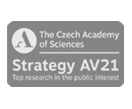International Mobility of HIPC´s Researchers

Project Name: Implementation of the state-of-the-art physico-chemical methods fo studies of innovative materials and bio/chemical processes
Grant Provider: Czech Republic - Ministry of Education Youth and Sports as the managing authority of Operational Programme Research, Development and Education
The grant was awarded on the basis of a request for support on October 10th 2017 under the call 02_16_027 International Mobility of Researchers (MEYS, OP RDE)
Operational Programme: Operational Programme Research, Development and Education
Priority Axis: PO2 – Development of universities and human resources for research and development
Project Registration Number: CZ.02.2.69/0.0/0.0/16_027/0008355
Total Project Costs: CZK 19 897 788,00
ESF Co-financing Rate: 75,9 %
Project Duration: 1.5.2018 - 31.3.2022 (47 months)
Annotation:
J. Heyrovsky Institute belongs to the top research centres in the fields of material sciences and ultrasensitive characterisation of chemical and biophysical processes. The aim of this project is the implementation of the state-of-the-art methods to study (bio)materials and associated processes with high precision and speed. The additional target is the non-invasiveness of the methods
Main Objective:
The primary aim is to improve the available analytical tools for a superior characterisation of materials and opto-electronic/photonic systems developed at J. Heyrovsky Institute. New methods should also enable improved understanding of studied chemical and biological processes. The project is focused on the advancement of already existing methods: mass spectrometry, Raman and fluorescence spectroscopy and microscopy, photoelectron spectroscopy, as well as some electro- and photochemical analytical processes. A better understanding the properties of tested materials and their potential dynamic changes will be enabled by the combination of selected methods. Rapid monitoring of dynamic processes will be accomplished by the implementation of more sensitive and faster detectors. Additionally, uncoventional approaches applied to these methods will open the access to broader analytical spectra or non-standard electromagnetic phenomena with a potential to discover exceptional material properties. The implementation of these new methods will be accelerated by novel international collaborations established during this project.
Key Activities:
-
Advanced fluorescence microscopy to study proteins on/in membranes of living cells
-
Fluorescence spectroscopy for studying protein structures
-
Study of electron – and photon – induced reaction dynamics in isolated molecules and nanoparticles
-
Nanoscale characterization of new materials for optoelectronics
-
Manipulation of the optoelectronic structure of low-dimensional materials
-
Hybrid structured layer composite materials
-
Advanced fluorescence microscopy of amyloid proteins
-
Study of lipid membrane organisation using advanced microscopy and spectroscopy
-
Time resolved Raman spectroscopy
-
Techniques of nano-bio-physics in cold molecular beams
-
Imaging ultrafast atomic and molecular processes with time- and position-sensitive detectors
-
Study of 2-D materials
The project is co-financed by the European Union.















